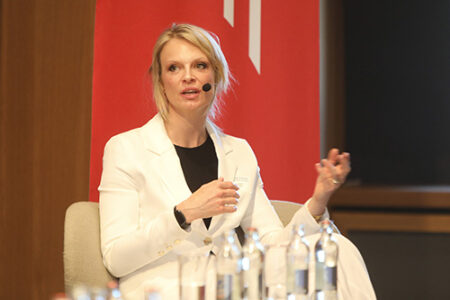

Support, scaling, funding: Luxembourg’s startup strategy
Three experienced entrepreneurs and Luxinnovation’s CEO discuss the strengths of Luxembourg’s startup support ecosystem and the areas that need further efforts.
 Lena Mårtensson
Lena Mårtensson
Over the past years, Luxembourg’s startup ecosystem has blossomed into a thriving community of around 550 young, innovative companies. The support available for startups has also increased significantly, with more than 15 incubators, accelerators and innovation hubs – several of which are public-private partnerships – offering office space and support.
However, more is still needed for the country to become a fully-fledged startup nation. A panel discussion entitled “Luxembourg’s Path to Startup Nation,” held during the Luxembourg International Business Summit on 4 June 2024, organised by the British Chamber of Commerce for Luxembourg, focused on the next steps to take.
Personal support: the real differentiator
 The rapid growth of Luxembourg’s startup community reflects the country’s international attractiveness. Most founders are from abroad and choose Luxembourg for various reasons. Tadaweb, a small data platform for scaling open-source intelligence for discovering and analysing information on the internet, came to Luxembourg in 2011.
The rapid growth of Luxembourg’s startup community reflects the country’s international attractiveness. Most founders are from abroad and choose Luxembourg for various reasons. Tadaweb, a small data platform for scaling open-source intelligence for discovering and analysing information on the internet, came to Luxembourg in 2011.
The most valuable support came from Luxinnovation. We had a dedicated contact person who truly understood what we wanted to do and supported us all the way.
“We were initially based in Brussels, but early on we got the opportunity to visit a tech fair in Luxembourg and get exposed to the local ecosystem. It was amazing,” said Tadaweb founder, Genna Elvin. “The facilities available at the incubator Technoport and the country’s central location, making it very easy to travel to London or Paris, were attractive.”
However, the most important factor for the company’s decision to move was the support provided by the ecosystem. “The most valuable support came from national innovation agency Luxinnovation, which helped us develop our business plan and business model and get access to different resources. We had a dedicated contact person who truly understood what we wanted to do and supported us all the way.”
Leo Benkel, founder of tech advisory company Pure Lambda, came to Luxembourg after ten years in Silicon Valley and had a similar experience. “My main culture shock was the amount of support received. I once got an unexpected call from the Chamber of Commerce and got really nervous as I thought we had done something wrong. But they just wanted to know if I needed anything!”
The quest for scaleups
Support for early-stage startups is one of Luxembourg’s recognised strengths. The main efforts now need to go into developing the right conditions for more mature startups to scale, both in market reach and size. Tadaweb, which today has over 100 employees and offices in London, Paris and Ottawa, is one of the successful pioneers.
“The ecosystem has evolved so much since we got here,” said Ms Elvin. “Back then, Luxembourg was a financial hub and not used to technology startups. We saw it as a challenge to change the status quo, and today the country’s positioning has clearly evolved.”
 Access to talent, notably in the digital and data fields, is one of the remaining challenges and a problem that Luxembourg shares with many other places around the world. “A roadmap to address the problem is in place. The University of Luxembourg’s Interdisciplinary Centre for Security, Reliability and Trust (SnT), with its over 500 researchers specialised in IT, is one very interesting source of talent. The number of researchers who stay in Luxembourg after the end of their research contract is already quite important, but there is more potential to increase the retention rate,” said Sasha Baillie, CEO of Luxinnovation.
Access to talent, notably in the digital and data fields, is one of the remaining challenges and a problem that Luxembourg shares with many other places around the world. “A roadmap to address the problem is in place. The University of Luxembourg’s Interdisciplinary Centre for Security, Reliability and Trust (SnT), with its over 500 researchers specialised in IT, is one very interesting source of talent. The number of researchers who stay in Luxembourg after the end of their research contract is already quite important, but there is more potential to increase the retention rate,” said Sasha Baillie, CEO of Luxinnovation.
Another issue is the skillset needed to successfully take a young company from startup to scaleup. Luxinnovation is currently running a pilot version of a scaleup support programme with three promising startups as use cases. “We are taking a very detailed look at what their problems are and what they need to become real scaleups. Our objective is to design a programme that targets the right points,” said Ms Baillie.
Boosting VC funding
 Access to risk-willing funding is crucial for companies in the process of scaling. “We have a larger venture capital platform in Luxembourg than 20 years ago, and the government has taken action by inviting foreign VCs to come to Luxembourg with the help of state bank SNCI. Still, Luxembourg is the second largest spot in the world for the fund industry, but we have not yet been successful in building a similar VC structure,” said Robert Dennewald, president of the board of building materials manufacturer Contern S.A., who has been involved in several startups as a business angel. He pointed out that without risk-willing capital, it is very difficult for startups to find new investors or get a bank loan.
Access to risk-willing funding is crucial for companies in the process of scaling. “We have a larger venture capital platform in Luxembourg than 20 years ago, and the government has taken action by inviting foreign VCs to come to Luxembourg with the help of state bank SNCI. Still, Luxembourg is the second largest spot in the world for the fund industry, but we have not yet been successful in building a similar VC structure,” said Robert Dennewald, president of the board of building materials manufacturer Contern S.A., who has been involved in several startups as a business angel. He pointed out that without risk-willing capital, it is very difficult for startups to find new investors or get a bank loan.
The Fit 4 Start accelerator programme has been set up to remediate this situation. The programme offers selected startups six months of coaching and subsidies of up to €150,000 to help them get up and running. “The public funding has made it possible to leverage a far greater amount of private funding,” said Ms Baillie. “The combination of the two sources is essential.”
We do need to take more risk and make it easier for companies to grow, but Luxembourg could also invest in ventures that need more time – bigger, bolder projects for humanity.
Europe is generally considered as lagging behind the United States in terms of the ease of starting a company and access to capital. “It is true that in Silicon Valley things are really fast and you know in three months whether your business will work out or not. In Europe, the process is slower,” said Mr Benkel, while pointing out that this is not only a negative point. “In the US, people want quick cash, while here in Europe there is a better quality of life and more of a long-term perspective. We do need to take more risk and make it easier for companies to grow, but Luxembourg could also invest in ventures that need more time – bigger, bolder projects for humanity.”
Photo credit: ©Steve Eastwood







